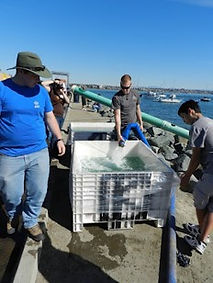
Collaborative Fisheries Research Charters

The most powerful way to work collaboratively with fishing communities is on the water. A fantastic example of this is the California Collaborative Fisheries Research Program (CCFRP). I led numerous research charters aboard Commercial Passenger Fishing Vessels (CPFVs) for multiple projects. This created win-win-win scenarios of vessel captains and crew getting charter business, volunteer anglers participating directly in the science, and scientists collecting data to inform management and sustainability of the resource.
Seminars
Joining seminars with fishing industry professionals and representatives provides a fun and entertaining way to merge ocean expertise, talk about fisheries through different lenses, and engage with a live audience of fishermen and women. It's always an opportunity for mutual learning! Fishing industry trade shows are great places to participate in seminars, connect with anglers, and merge fishing expertise with scientific understanding.

Crew Trainings
Fishing vessel captains and crews are on the water more than anyone. They can provide valuable knowledge about local resources, but they can also add capacity for data collection under the right circumstances. I was a science advisor for the SAC Fisheries Sampling Program, which is an excellent example of this type of collaborative, crew-managed data collection. This program is a collaboration between the Sportfishing Association of California and NOAA Fisheries, and has recently expanded statewide from data collection for tunas to include rockfishes and basses.
Fishing Tournaments
Tagging fish at fishing tournaments and engaging with the recreational fishing community as both and fisherman and a scientist has always felt very rewarding for me. There is an enormous and largely underutilized opportunity in having so many anglers who can provide access and live release of a large number of fish in a single location. I have tagged fish and shared research with anglers at the Balboa Angling Club tournament as well as the San Diego Anglers Open Bay Bass tournament.


Trade Shows

Industry trade shows provide an enormous opportunity to communicate directly with thousands of people who represent a wide variety of stakeholder groups and values associated with natural resources. These events represent a particularly useful way of generating angler survey data, but more importantly, they're a wonderful way to become a part of a community that cares deeply about healthy ecosystems, species, and resources.
Fishing Club Presentations
There are numerous local, regional, state, and national fishing clubs and associations around the country. Engaging with these groups is a fantastic way to have in-depth conversations with folks who may be very specialized in their fishing interests or expertise. This can be another amazing opportunity to learn and share information. I have given numerous presentations to several organizations, including the Southern California Tuna Club, San Diego Dive Club, San Diego Rod and Reel Club, San Diego Anglers, Saltwater Bass Series, Saltwater Bass Anglers, Oceanside Anglers, and the Sportfishing Institute of British Columbia.




Popular Literature Articles/Websites
Website and magazine articles can be an excellent way of sharing research updates before a study is ready for peer-reviewed publication in the scientific literature, or for sharing final scientific findings and potential management implications for broad audiences. The widespread use of social media accelerates this sharing, which can broaden the impact of science far beyond relatively small academic or management audiences.
